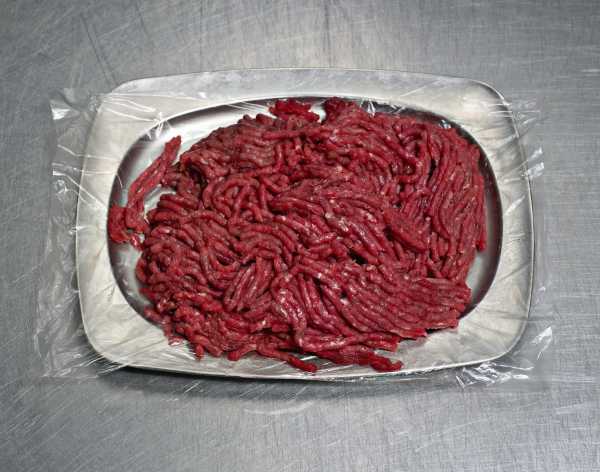
An Arizona-based meat company is recalling 6.5 million pounds of raw beef because it may be contaminated with salmonella, the US Department of Agriculture’s Food Safety and Inspection Service announced Thursday.
The recalled meat, which includes products like ground beef and sirloin trimmings, was packaged from July 26 to September 7, and sold in stores under the brand names Cedar River Farms Natural Beef, Comnor Perfect Choice, Gourmet Burger, Grass Run Farms Natural Beef, JBS Generic, Showcase, and Showcase/Walmart. Health officials are warning that consumers should throw out any of these products they find in their fridges and freezers. (See here for a detailed list of the recalled products and product labels.)
To date, 57 cases of salmonella illness in 15 states have been linked to the meat that’s been recalled. Most of these illnesses were diagnosed from August 5 to September 6. It took several weeks for USDA, the Centers for Disease Control and Prevention, and others to discover the Arizona producer — JBS Tolleson, a subsidiary of JBS, the largest meat company in the world — was the common supplier linking the cases.
Salmonella sickens 1.2 million Americans every year and causes 450 deaths. Bacteria-contaminated foods — eggs, chicken, beef, milk, and raw produce — are the source of the vast majority of illnesses. The most common symptoms of salmonella poisoning are diarrhea, fever, and abdominal cramps. Most people get better within a week and don’t need any treatment. But the antibiotic-resistant stain, Salmonella Newport, implicated in the current outbreak is more difficult to treat and more likely to cause hospitalization and death.
So why did it take more than a month to recall these potentially deadly meat products? You can thank the wacky and problematic way we regulate meat in this country.
Food producers can sell salmonella-contaminated meat as long as it’s going to be cooked
The Food Safety and Inspection Service (FSIS), part of USDA, is in charge of meat safety in the US. It prohibits the sale of ground beef contaminated with certain strains of E. coli. But there’s a loophole when it comes to salmonella: It isn’t on that prohibited list of adulterants. That means companies are allowed to sell raw meat that they know is contaminated with salmonella as long as it’s going to be cooked. (Cooking ground beef until it reaches an internal temperature of 160 °F kills off the bacteria.)
Going back to the Nixon-era, public health groups tried to petition FSIS to change the system so that salmonella-contaminated meat wasn’t going out to consumers. “It’s one of these odd vestiges of the food regulatory system,” Bill Marler, a food safety attorney, explained. “But FSIS said housewives aren’t stupid, they’ll cook the meat,” he added, and the industry pushed back on the regulations.
To the chagrin of food safety experts, the same system has remained intact. “Salmonella is not considered an adulterant,” Marler said. That means it’s up to consumers to make sure their beef products are fully cooked. Marler believes that’s a failing of the current system because people don’t always adequately cook their foods and outbreaks, like the current one, continue to happen.
The Center for Science in the Public Interest had continued to push for change, but even recent petitions have gotten rejected by the USDA because the agency said it wouldn’t be able to distinguish antibiotic-resistant salmonella, the focus of the petition, from other types.
“If there was no salmonella contaminated meat going to the grocery stores, people wouldn’t be getting sick,” said Sarah Sorscher, the Center for Science in the Public Interest’s deputy director of regulatory affairs.
So under the current system, FSIS waits for illnesses to stack up and for a test to link those illnesses to certain products before issuing recalls. And that’s exactly what’s happening now. It’s also why you should check your freezers for the recalled products on the list and make sure you cook your meat fully. Or, since America needs to reduce its meat consumption, consider avoiding beef entirely.
Sourse: vox.com






